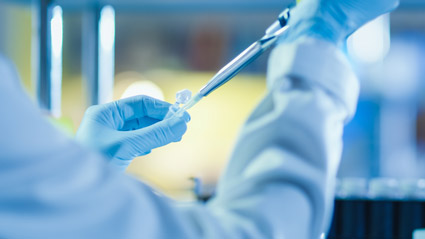Synthetic biology
Overview
Synthetic biology owes its inception in the early 2000’s to the great strides made in genomics, the understanding of evolution, and systems biology. Synthetic biology—in contrast to its biological roots—applies engineering principles of standardization and controlled circuits to create biological solutions for advances in industry, agriculture, environment, and healthcare. Finding sustainable biological solutions has been accelerated by decreased costs in synthesizing and sequencing DNA, and most recently by the discovery of CRISPR genome editing. Considering both the standardization of processes and the availability of reagents to create, decode, and edit DNA, synthetic biology is a burgeoning field of research that is continuing to impact and improve our lives.
What is synthetic biology?
Synthetic biology—or "SynBio” for short—is when the two disciplines of biology and engineering merge.
On the biological side, SynBio incorporates information obtained from systems biology, genomics, genetic engineering, molecular biology, evolutionary biology, and biochemistry. On the engineering side, SynBio incorporates principles and ideas from biotechnology, biophysics, computer science, nanotechnology, bioinformatics, machine learning, artificial intelligence, and in silico analysis and testing.
The overarching goal for synthetic biology research is to create biologically based solutions or products. In a similar way to how chemists take rudimentary chemicals from our planet to create plastics, alloys, and other complex materials, synthetic biologists attempt to engineer biology in the creation of new products for industry, agriculture, and healthcare in a sustainable manner.
What are the applications for synthetic biology?
SynBio has been used in many applications, and future applications are only limited by human imagination.
In industry, SynBio applications include:
- Production and manufacture of enzymes
- Sustainable production of biofuels
- Creation of bio-based specialty products
Synthetic biologists are applying engineering principles to biological discoveries to create microbial biosensors for pollutants and to develop microbes or plants for bioremediation of contamination or water pollution in the environment.
In healthcare research, synthetic biology facilitates:
- Rational drug design research
- Immunotherapy for cancer research
- Sustainability to medical practices
Breakthroughs in blood cancer research, such as Car-T therapy for lymphoma, use SynBio techniques to modify a patient’s immune system to impact their cancer. This cutting-edge research has the potential to lead to treatments that could replace traditional chemotherapy for cancers such as Acute Lymphoblastic Leukemia(ALL) [1].
Agricultural biotechnology (Agbiotech) is a major benefactor of SynBio research. Applications using SynBio principles facilitate improvements and developments in:
- Sustainable farming practices
- Animal health
- Disease resistant crops and their yield
- Specialty foods, and reducing our dependence on traditional crops
One of the most important applications for SynBio brings the technology and scientific discovery full circle. As scientists use engineering principles to design biologically based products in agriculture, industry, healthcare and environmental studies, the lessons learned extend our knowledge of biological principles. Each new product or solution stretches our knowledge of how living things function.
Industry
- Enzyme production
- Biofuels
- Bio-based specialty products
- Bulk chemicals
Healthcare
- Drug design
- Immunotherapy
- Sustainably-produced medicines
- Vaccines
Agriculture
- Sustainable farming
- Soil additives
- Bio-based specialty foods
- Disease-resistant plants
Environment
- Biofuels
- Biosensors for pollution
- Bioremediation
- Waste treatment
What key technologies drive synbio?
SynBio relies heavily on many disciplines, while also relying on these key technologies:
- Manufacture of synthetic DNA in the form of short, single-stranded oligos or long, double-stranded DNA such as gBlocks™ Gene Fragments
- Genetic code determination with next-generation sequencing (NGS) technologies
- Genome editing using CRISPR technologies, engineered nucleases, and basic genetic engineering
On the engineering side, SynBio benefits from:
- Increased computer storage capacity and processing speeds
- Computer modeling and artificial intelligence
- Concepts of modularity, standardization, and digital circuits
Biology and standardization create SynBio products faster
Once a desired biological product is identified, synthetic biologists look for the genes that encode the product. Naturally occurring, biologically-based products, are often from plants or animals making the product hard to isolate on a large scale. Therefore, the genes that code for the natural product are then cloned, that is, isolated and placed in a host organism for production. In contrast, novel biological products can be created by rational design, utilizing the current understanding of how genes are expressed into proteins, and how the code of the gene dictates the protein shape and its ultimate function.
To increase the speed of making biological products, SynBio researchers design genetic “parts” that can quickly be assembled to form all different types of genetic constructs, similar to how electrical circuits can be made from a variety of switches, conductors, transistors, and power sources. These genetic “parts” are synthetic DNA with the desired genetic codes, which are then assembled and converted into an actual product using cell-free systems or host organisms. The final enzyme, biofuel, drug, biosensor, etc. can then be purified in large quantities for use in agriculture, industry, healthcare, and environmental applications.
Synthetic Biology Techniques
Products for synthetic biology
Working on a new biological product, idea, or need to improve your current cloning procedure? See how gBlocks Gene Fragments and custom gene synthesis can speed up your research.
Explore resources
References
- DuVall A, Sheade J, Anderson D, et al. (2022) Updates in the Management of Relapsed and Refractory Acute Lymphoblastic Leukemia: An Urgent Plea for New Treatments Is Being Answered!. JCO Oncology Practice. 10.1200/OP.21.00843.


 Processing
Processing


